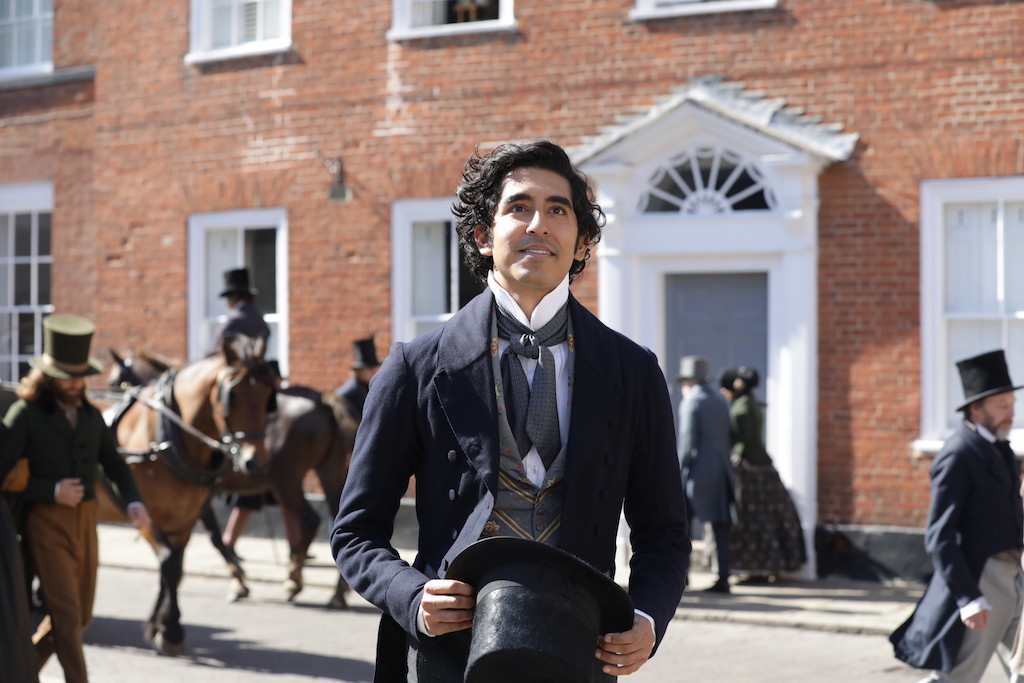
It is somewhat astonishing to me that Armando Iannucci, the merciless satirist behind Veep, The Death of Stalin, and In the Loop, has made a film as joyful, fanciful, and life-affirming as The Personal History of David Copperfield. The film has a generosity of spirit—it finds room in its big heart for nearly everyone. Of course, this being an adaptation of the Dickens novel, there are dastardly villains—and kudos to Ben Wishaw for being able to run the gamut from Byronic sad boi to uber nerd to the most sniveling sort of villain that he plays here—but mostly there are wonderfully flawed, but lovable humans, made all the more endearing through their eccentricities.
Similar to Greta Gerwig’s Little Women, which came out late last year (or was it this year?—I swear all the days are blurring together at this point), this is a film about the evolution of a writer, and the events that we see unfolding will eventually become the book itself. Many believe that Copperfield (Dev Patel as an adult) is a stand-in for Dickens and, like Dickens, he’s a naturally gifted observer—he keeps scraps of paper with him at all times where he jots down quotes, thoughts, and the distinguishing features of the people he meets along the way. In some ways, the film—and the book—is about how a young writer, so keenly observant of those around him, so quick to absorb the traits and attributes of those in his midst, becomes his own man. Throughout his life, David Copperfield acquires many nicknames—Daisy, Trotwood, Davy—but by the end of the movie he is fully himself.
The film follows his journey, from when he’s a small boy growing up with a doting mother and his boisterous maid, Peggotty (Daisy May Cooper), to when he’s cast out of his home by a vengeful stepfather, to his hardscrabble life on the streets and factories of London, to his young adulthood at the pastoral home of his eccentric aunt (Tilda Swinton), through prep school, a law office, a second bout of pennilessness, and beyond.
He meets all sorts of rogues and gentlemen (and ladies) along the way, among them Peter Capaldi’s Mr. Micawber (if anyone was born to play a Dickensian rascal, it’s Capaldi), who spends much of his day dodging creditors while still managing to be a somewhat doting husband and father (albeit terrible harmonium player). There’s also Hugh Laurie’s Mr. Dick, a kind-hearted, if somewhat simple soul who believes that he is burdened by the actual memories of the beheaded King Charles I. (Copperfield helpfully suggests he tapes the thoughts to a kite and release them to the winds—a metaphor for the catharsis of writing, if ever I’ve seen one). There’s Agnes (Rosalind Eleazar), who matches Copperfield in both kindness and quick wit—if only he weren’t so moon-eyed over the daffy Dora Spenlow (Morfydd Clark).
The list goes on. The film is wonderfully stuffed. Iannucci also chose to go completely color blind with his casting, Hamilton-style, for reasons that aren’t completely clear but seem to add to the film’s overall good mood (it also assures that the best actor will be cast for each part).
We don’t always associate Dickens with humor, but we should—dude was a funny guy. And Iannucci teases out every laugh from the text—but it’s more visual humor than the kind of sniping wordplay we’ve come to expect from him. To wit: There’s a hilarious scene where Tilda Swinton’s Betsy Trotwood tries to hide the brandy and glasses stashed in a globe-shaped cabinet on wheels from a notoriously drink-happy guest. In another scene, Copperfield attends a deeply uncomfortable afternoon tea where the cake served is so heavy it lands on the table with a thunderous thud. In another scene, creditors come after Mr. Micawber’s possessions, including a carpet runner that they pull from under the door—they observe this when the baby in her carriage, which is on the runner, suddenly begins jolting toward the door. All of this is very funny, in an antic, almost cartoonish sort of way. There’s also a magical house boat, some stubborn donkeys, and a talking dog (of sorts). I think children will enjoy this film as much as adults.
As for Patel, he makes a wonderful Copperfield—sturdy, kind, charismatic, and filled with a childlike curiosity and wonder even into adulthood (and, of course, great hair).
“You had nothin’, then you somethin’, now you’ve got nothing again,” Peggotty tells Copperfield at one low point. “So stands to right you’ll have somethin’ again.” That kind of comforting optimism permeates the film. Copperfield goes through some hardship (again, it’s Dickens) but we never doubt that his personal history will have a happy ending.
The Personal History of David Copperfield is playing exclusively in theaters, including The Senator. Check your local listings.
